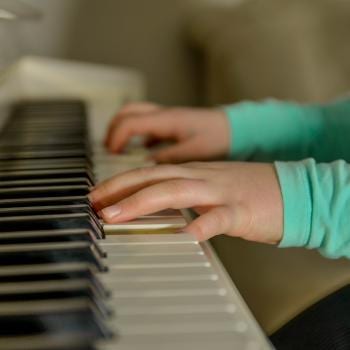I recently got a rather odd comment on a post in which I discussed Michael and Debi Pearl and their child training methods:
You are taking the book out of context. The point they continued to emphasize was that you need to keep in communion with your children and the rod is a tool to stay connected.
Look, the book is now online, so it’s not like people can’t read it for themselves and see whether or not I’m not taking it out of context (I’m not). But the thing is, it is true that the Pearls talk a lot about what they call “tying strings.”
Enjoy your children. Make yourself indispensable to their happiness. Maintain fellowship with your children. Earn their respect. Become an example of cheerfulness. Create an atmosphere of good will that makes them want to obey you.
It’s this sort of thing that makes parents like mine praise the Pearls up and down, and quickly disavow any criticism. The Pearls emphasize having a close and loving relationship with your children. They talk about houses filled with laughter and fellowship, and turning the hearts of the children toward their parents. It’s all beautiful and bubbly and rainbows.
Except for the rod, and the idea that parents must conquer their children.
I’m honestly not sure how people like the Pearls or the commenter quoted above honestly think that the rod—or the strictly-enforced requirement that children must obey every parental command immediately and without question—is a tool to help parents stay connected with their children, to aid in creating communion between parents and their offspring. It doesn’t work like that. I mean, try transferring this same mentality to the spousal relationship: “Sorry honey, I’ve been feeling a bit disconnected from you lately. I guess I’ll just have to hit you with this stick! I mean, you want to keep in communion with me, right?” Sounds crazy now, right?
Look, I was raised on the Pearls’ methods, and the idea that those methods connect parent and child is ludicrous. I learned to obey my parents not because I wanted to, but rather because I didn’t have a choice. You can’t expect to end up with a child who obeys you because she wants to obey you if you don’t even give her an alternative option. It doesn’t work like that. Here’s a quote from To Train Up a Child that serves as a good example of this:
One father tells of his training sessions with each new toddler. He sets aside an evening for “booty” camp, which is a boot camp for toddlers. The child of ten to twelve months is left alone to become deeply interested in a toy or some delightful object. From across the room or just inside the other room, the father calls the child. If he ignores the call, the father goes to him and explains the necessity of immediately coming when called, and then leads him to the father’s chair. The child thus led through these paces is being programmed.
He is returned to the toy and left alone long enough to again become engrossed. Another call, and, if no response, the father gives a patient explanation and demonstration of the desired response. The parent, having assured himself of the child’s understanding, once again sets up the situation and calls the child. This time, if there is not an immediate response the child is lightly spanked and lectured. The father continues this throughout the evening until the child readily and immediately responds to a summons. Thereafter, until the child leaves home, he is expected to drop everything and come upon the first call. As long as the parents remain consistent, the child will consistently obey. This “obedience training” is carried out in the utmost patience and concentration. The spanking should not be viewed as punishment, but as reinforcement to commands.
What in the world does Pearl think the use of the rod is teaching these children? In the scenario he describes, the baby isn’t given any option but to obey. The “boot camp” won’t end until the baby obeys, after all, and if the baby doesn’t obey he will be hit until he does so. How does Pearl expect to end up with children who obey because they want to if those children aren’t given any other option, and are faced with physical pain if they don’t obey?
The only thing I remember the rod teaching me is that when I didn’t obey I would pay for it, and that I should be afraid of my mother and father because if I stepped out of line I would end up with a spanking. Even when I was a teen and my mother’s right hand girl, I still feared her, because I knew what would happen if I didn’t obey and please her—the time when I “sassed” her and was rewarded with a slap in the face, hard, was seared in my memory.
The rod never made me feel connected to my parents. Ever. Actually, it made me feel afraid of them. And that’s sure as hell not the same thing.














